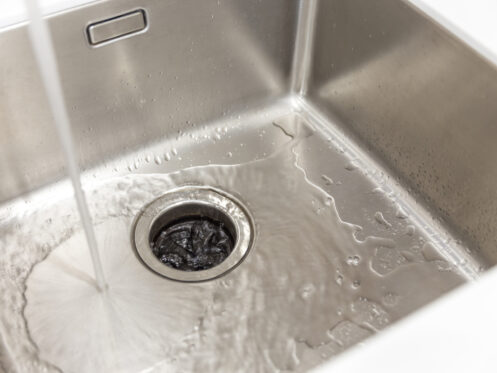Garbage disposals have become essential fixtures in modern kitchens, offering a convenient way to manage food waste. However, since they’re tucked away beneath the sink, it’s easy to overlook their maintenance needs. Just like any other appliance in your home, garbage disposals require regular care to function efficiently. Proper maintenance ensures that your garbage disposal stays in optimal condition, extending its lifespan and reducing the likelihood of costly repairs.
How a Garbage Disposal Works
A garbage disposal uses mechanical and motorized processes to process food waste. Most garbage disposals have two main sections: the upper chamber and the lower chamber. The upper chamber sits closest to the splash guard in your sink. This chamber houses the garbage disposal’s flywheel, grinding ring, and impellers. All of the upper chamber’s components work together to use centrifugal force to pulverize food into a pulp. The pulverized food particles then move to the garbage disposal’s lower chamber. This chamber allows the pulp to mix with water before flowing into the P-trap and down the drainpipe to your sewer system.
Other garbage disposal components include the motor, plumbing connections, and safety features. The motor powers the initial grinding action using electricity. The thermal overload protector cuts power to the disposal if it becomes too hot, preventing damage to the motor. If this feature is triggered, you can reset the disposal by pressing the red button on the bottom or side of the unit once it cools down. Disposals also have a ground fault circuit interrupter (GFCI) that stops the flow of electricity to prevent water-related electrical hazards.
Why Is Garbage Disposal Maintenance Important?
Regular upkeep ensures that your garbage disposal performs at its optimal level. The most important reasons for garbage disposal maintenance include clog prevention, odor elimination, and improved kitchen hygiene. Garbage disposal maintenance is also essential for the early detection of defects or leaks and to maximize your appliance’s longevity.
Clog Prevention
An important part of maintaining your garbage disposal is being mindful of what you put down it. A common misconception is that garbage disposals have blades that chop food into small pieces. Garbage disposals actually have impellers that compress organic material into a paste that can eventually flow to your sewer pipe. You can jam or clog that appliance if you try to grind the wrong foods, like tough vegetable husks, bones, or fruit and potato peels. Clogs can also form in the P-trap if you continuously pour grease or coffee grounds into the disposal or use insufficient water during the pulverizing process.
Odor Elimination
Garbage disposals play a crucial role in managing soft food waste, but leftover food particles can sometimes get trapped in crevices and begin to decompose. This decay can result in unpleasant odors that linger in your kitchen. Regular cleaning is important to prevent buildup and reduce these foul smells. It’s essential to resist the urge to use commercial drain cleaners when dealing with a smelly garbage disposal. They contain harsh chemicals that can damage your plumbing and the garbage disposal itself over time.
Improved Kitchen Hygiene
Buildup in your garbage disposal can lead to the growth of harmful bacteria and other biological hazards. This buildup not only creates unpleasant odors but can also compromise the overall hygiene of your kitchen. For instance, if mold or mildew develops within the disposal, it can release spores into the air, potentially aggravating respiratory issues for household members who use the kitchen.
Increased Efficiency
One of the primary benefits of owning a garbage disposal is its ability to get rid of food scraps while cooking or cleaning up after a meal. However, a lack of cleaning or malfunctions can hinder the unit’s effectiveness. Food scraps may linger in the internal chambers for extended periods or may fail to exit the P-trap altogether. Additionally, issues with the motor can diminish the appliance’s performance, leading to reduced power and, in some cases, complete failure to turn on. Maintaining your garbage disposal ensures that it’s always available to make kitchen cleanup easier.
Leak Detection
It’s essential to inspect your garbage disposal regularly for leaks. Leaks associated with the unit can result in warped cabinetry, mold growth, pest infestations, and other forms of moisture damage. A garbage disposal can develop leaks around its plumbing connections, drainage hose, or outer casing. They can lead to rust, corrosion, and other problems. In addition, water exposure near the motor or electrical connection is a potential safety hazard, so it’s imperative to hire a plumber to diagnose and fix any under-the-sink leakage issues.
Extended Garbage Disposal Lifespan
Proper maintenance helps conserve your garbage disposal’s lifespan. According to the International Association of Certified Home Inspectors (InterNACHI), the life expectancy of a garbage disposal is 10-12 years. However, neglect or repeated misuse can significantly shorten its lifespan. Routine upkeep keeps this appliance in working condition and helps you avoid costly repairs or replacements.
What Are the Signs That Your Garbage Disposal Needs Professional Attention?
Experts recommend you have your garbage disposal inspected regularly by a professional, and it can often be done during your annual plumbing inspection. Regular inspections can help identify potential issues before they become major problems and save you money on repair costs. However, there are signs that you may need to contact a professional between inspections.
Jammed Device
If your unit makes a humming noise but doesn’t appear to be grinding any waste, a jamming problem is usually to blame. When a professional plumber encounters a jammed garbage disposal, they typically use a hex wrench to manually rotate the disposal’s impellers after disconnecting the unit from power. This allows them to remove the blockage safely. For more severe jams, they may need to remove the disposal from the sink and disassemble it to solve the problem.
Unusual Sounds
Strange noises can also indicate that your unit needs professional attention. While the garbage disposal may make an initial grinding sound until food particles become reasonably small, it should never make ongoing loud noises. Sounds like rattling can indicate issues with the internal components of your appliance. A plumber can perform troubleshooting on the unit to identify the exact cause. For instance, the unit may have a loosened internal part that needs tightening or a worn component that needs to be replaced.
Burning Smell
If your garbage disposal smells like burning plastic, the issue is usually a loose electrical connection or a faulty motor. A technician can tighten electrical connections or replace your unit’s motor to get your disposal back in working order.
Contact Us Today
At Plumbtree Plumbing & Rooter, we have been serving the residents of San Jose, Silicon Valley, and surrounding areas for years. We are expert plumbers who offer plumbing fixtures, drain cleaning, leak detection, and repiping services. Additionally, we can help when you have a problem with your plumbing appliances, such as water heaters and garbage disposals. Contact us today to schedule an appointment with one of our knowledgeable team members.

